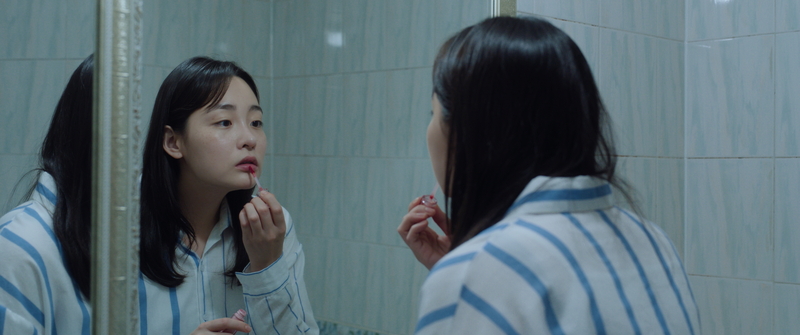
How a One-Joke Premise Stretches Into Cult Status
MOVIE REVIEW
The Odd Job [Blu-ray]
–
Genre: Comedy, Dark Comedy
Year Released: 1978, Severin Films Blu-ray 2025
Runtime: 1h 27m
Director(s): Peter Medak
Writer(s): Graham Chapman, Bernard McKenna
Cast: Graham Chapman, David Jason, Diana Quick, Simon Williams, Edward Hardwicke, Bill Paterson, Carolyn Seymour, Richard O’Brien
Where to Watch: available now, order your copy here: www.severinfilms.com
RAVING REVIEW: At first glance, THE ODD JOB feels like an easy sell. Graham Chapman, just off the height of Monty Python’s success and on the cusp of LIFE OF BRIAN, co-writes and stars in a dark comedy about a man so desperate that he hires someone to kill him. Directed by Peter Medak and featuring David Jason, Diana Quick, Richard O’Brien, and Carolyn Seymour, the film assembles a lineup of British talent that should, by all accounts, have guaranteed success. Yet the result is something stranger: a black comedy that teeters between brilliance and commonness, remembered today as much for its production oddities as for its jokes.
The story is simple, almost to the point of being aggressively so. Arthur Harris (Chapman), a middle-class man whose wife Fiona (Diana Quick) abruptly leaves him, spirals into despair. Failing repeatedly to kill himself in various attempts, he finds a solution when a peculiar handyperson—simply known as the Odd Job Man (David Jason)—shows up at his door. Harris hires him to do the deed at an unspecified time, believing he’s solved his problem. But when Fiona has a change of heart and returns, Arthur discovers to his horror that contracts with assassins aren’t so easily canceled.
The premise, inspired by a short story Chapman wrote with Bernard McKenna, is classic fodder: one absurd idea spun out into a string of misadventures. However, in expanding the sketch into a feature-length narrative, the thinness of the concept becomes more apparent. Critics at the time and since have noted that it feels padded, with scenes that lean more toward run-ons than escalation. Still, there’s a charm in watching Chapman’s Arthur bumble through increasingly bizarre encounters with the relentless Jason.
Jason’s performance is arguably the film’s secret weapon. Jason embodied a character who is polite, understated, and chillingly matter-of-fact about his work. He’s no flamboyant hitman—just an ordinary man in a leather coat who treats murder as another “odd job.” That incongruity between his demeanor and his assignment creates some of the film’s best laughs. He’s also a reminder of the British comedy tradition that thrives on understatement, even in the darkest setups.
Chapman, by contrast, is playing against expectations. Known within Python as the anarchic wild card, here he leans into a more subdued, almost melancholy role. Arthur is hapless, occasionally bitter, often pathetic, and rarely in control. Chapman commits to the part, but the role doesn’t give him the freedom Python sketches did. As a result, some of the energy feels muted, though moments—like Arthur’s restaurant disguise or his zoo misadventures—carry the kind of surreal spark that Chapman fans crave.
Diana Quick brings an edge as Fiona, complicating Arthur’s misery with her unexpected return. Carolyn Seymour provides both glamour and bite as a flirtatious neighbor. Richard O’Brien, ever the scene-stealer, makes a smaller appearance, a reminder of his penchant for theatrical eccentricity. Bill Paterson and Edward Hardwicke lend credibility as skeptical policemen, grounding the chaos with straight-faced suspicion.
Medak’s direction is skillful, capturing the London of the late ‘70s in a way that now feels oddly nostalgic. The film isn’t stylish—its staging often resembles extended television comedy rather than cinematic construction—but it has a scrappy appeal. Behind the scenes, the project was dogged by trouble: the role of the Odd Job Man was originally intended for Keith Moon of The Who, whose substance issues made that impossible, and Medak stepped in only after the original director was sidelined. These hiccups are evident in the uneven tone, but they also lend the film a cultish aura as a “what could have been.”
Tonally, THE ODD JOB lands in an awkward space between dark comedy and farce. Its premise suggests biting satire—after all, the desire to outsource one’s own death could be a savage critique of British repression or the banality of despair. But the execution often veers into slapstick. Arthur’s mishaps, for instance, feel more sitcom than subversive. Yet occasionally, the absurdity reaches a point: Jason’s calm insistence on finishing the job, regardless of Arthur’s protests, resonates as a bleak metaphor for inevitability, even if it is wrapped in comic absurdity.
The legacy of THE ODD JOB has always been tied to Monty Python. As Chapman’s first solo film, it carries the weight of expectation. Fans hunting for “lost Python” humor may be disappointed; it’s not filled with surreal sketches or rapid-fire wit. Instead, it’s a quieter, stranger project —a transitional piece that shows Chapman’s willingness to explore comedy outside the troupe. In that sense, it’s more curiosity than classic—but curiosity can still be valuable.
Severin Films’ 2025 release elevates the film to a status beyond mere footnote. Restored in 2K from Medak’s personal print, the release contextualizes the production through new interviews with Medak, Jason, McKenna, and others. These extras highlight the affection many still hold for the project, even if it never achieved Python-level acclaim. For fans of British comedy history, the release rescues a film that risked slipping into obscurity, offering a chance to reevaluate it with fresh eyes.
THE ODD JOB is less about perfection than about charm. It’s uneven, yes, and its central joke wears thin before the credits roll. But it also contains flashes of wit, strong performances, and the unmistakable stamp of Graham Chapman’s off-kilter worldview. For Python devotees, it’s a rare chance to see Chapman in a lead role, working through his instincts in a new context. It’s not a comedy classic, but it’s an oddity worth rescuing—which makes its resurrection by Severin feel not just justified, but essential.
Please visit https://linktr.ee/overlyhonestr for more reviews.
You can follow me on Letterboxd, Instagram, Twitter, and YouTube. My social media accounts can also be found on most platforms by searching for 'Overly Honest Reviews'.
I’m always happy to hear from my readers; please don't hesitate to say hello or send me any questions about movies.
[photo courtesy of SEVERIN FILMS]
DISCLAIMER:
At Overly Honest Movie Reviews, we value honesty and transparency. Occasionally, we receive complimentary items for review, including DVDs, Blu-rays, CDs, Vinyl Records, Books, and more. We assure you that these arrangements do not influence our reviews, as we are committed to providing unbiased and sincere evaluations. We aim to help you make informed entertainment choices regardless of our relationship with distributors or producers.
Amazon Affiliate Links:
Additionally, this site contains Amazon affiliate links. If you purchase through these links, we may receive a commission. This affiliate arrangement does not affect our commitment to honest reviews and helps support our site. We appreciate your trust and support in navigating these links.



Average Rating